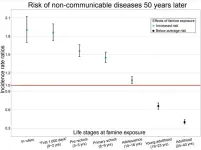(Press-News.org) Shelter dogs followed at their new homes for six months post-adoption were reported as showing more behaviors like stranger aggression or training problems by the end of the study—but owner satisfaction remained high, with 94 percent of owners reporting their dog’s behavior as excellent or good, according to a study published August 16, 2023 in the open-access journal PLOS ONE by Kyle Bohland from the Ohio State University, US, and colleagues.
Although two million dogs are adopted from US shelters every year, very little research has been done on shelter dog behavior after placement into a home. Bohland and colleagues surveyed the owners of 99 dogs adopted from five Ohio shelters from October 2020-May 2021, checking in with owners seven, 30, 90, and 180 days after adoption. In each iteration of the survey, dog owners were asked about the following problem behaviors, scoring each behavior as demonstrated by their dog from 0-4: excitability, stranger-directed aggression, owner-directed aggression, dog-directed aggression, familiar dog aggression, stranger-directed fear, nonsocial fear, dog-directed fear, touch sensitivity, separation-related behavior, attachment and attention-seeking, training difficulty, chasing, and energy levels. The initial survey asked about basic demographic information and whether the owner had owned a dog before. Each of the four surveys asked owners about overall satisfaction with their dog’s behavior; any household changes since adoption; and if they still owned the dog.
Most notably, owners reported an increase from the initial survey in stranger-directed aggression behavior at every subsequent check-in, which went from being reported in 62 percent of dogs at 10 days to 77 percent of dogs at 180 days—possibly because as dogs became more comfortable in their household, their protective/territorial behaviors increased. Over the six months of the study, owners also reported more excitability, touch sensitivity, training difficulty, and chasing behaviors as compared to baseline. Reports of separation-related behaviors and attachment and attention-seeking behaviors decreased, presumably as the dogs became assured their owners would consistently return home. In addition, seven people returned their adopted dog during the study period. Despite the ratings suggesting increases in undesirable behavior like stranger aggression and training problems, in the final survey 100 percent of responding owners reported their dog adjusted to their new home extremely or moderately well; 94 percent rated their dog’s overall behavior as excellent or good, six percent as fair, and no owner reported poor/terrible behavior. About 75 percent of owners said they thought their dog’s behavior had improved over time.
Sampling bias is potentially present in the results, since participating dog owners opted into the study (with gift cards offered for completion of the first and final surveys). There may also be behaviors the survey did not capture, but which are strongly valued by owners and which might explain the high satisfaction ratings in the final survey.
The authors add: “This is one of the most comprehensive studies, using multiple timepoints, to investigate post-adoption behavior in dogs. The findings help shelters counsel new dog guardians with more accurate information on what behavior changes to expect after adoption. This information will hopefully allow people to get help sooner for their dog’s behavior problems and keep more dogs in their adoptive homes.”
#####
In your coverage please use this URL to provide access to the freely available article in PLOS ONE: https://journals.plos.org/plosone/article?id=10.1371/journal.pone.0289356
Citation: Bohland KR, Lilly ML, Herron ME, Arruda AG, O’Quin JM (2023) Shelter dog behavior after adoption: Using the C-BARQ to track dog behavior changes through the first six months after adoption. PLoS ONE 18(8): e0289356. https://doi.org/10.1371/journal.pone.0289356
Author Countries: USA
Funding: KRB, MLL, MEH, AGA, and JMO all received a grant from the Ohio State University College of Veterinary Medicine to fund the study. (Canine Grant No. 2020-13). URL: https://vet.osu.edu/research/intramural-grants. The funders had no role in study design, data collection and analysis, decision to publish, or preparation of the manuscript.
END
Good dogs: owners of recently-adopted shelter dogs tend to report high satisfaction with their new pet despite also reporting increases in problem behavior over time
Stranger aggression behaviors were reported in 62 percent of dogs immediately following adoption, but in 77 percent of dogs six months post-adoption
2023-08-16
ELSE PRESS RELEASES FROM THIS DATE:
Study uncovers impact of 1918 “Spanish flu” pandemic on infant health
2023-08-16
In the wake of the 1918/1919 “Spanish flu” influenza pandemic, the probability of low birth weight and stillbirth increased among women in Switzerland, according to a new study published this week in the open-access journal PLOS ONE Kaspar Staub of the University of Zurich, Switzerland, and colleagues.
Impaired neonatal health is an ongoing public health concern worldwide. Understanding determinants that impede normal fetal and infant development and growth is crucial for ameliorating neonatal ...
Schizophrenia genetic risk factor impairs mitochondrial function
2023-08-16
Researchers at Rutgers and Emory University are gaining insights into how schizophrenia develops by studying the strongest-known genetic risk factor.
When a small portion of Chromosome 3 is missing – known as 3q29 deletion syndrome – it increases the risk for schizophrenia by about 40 fold. Researchers have now analyzed overlapping patterns of altered gene activity in two models of 3q29 deletion syndrome, including mice where the deletion has been engineered in using CRIPSR, and human brain organoids, or three-dimensional tissue cultures used to study disease. These two systems both exhibit impaired mitochondrial ...
Greater excess mortality after hurricanes more recently and for most socially vulnerable in the U.S.
2023-08-16
Over recent decades, there was a large variation in cyclone-related excess deaths by hurricane, state, county, year, and social vulnerability for counties in the United States, with 83 percent of hurricane-related deaths occurring more recently and 94 percent in more socially vulnerable counties. Results of a study by researchers at Columbia University Mailman School of Public Health, Colorado State University, Imperial College London, University of California Irvine, and Harvard T. H. Chan School of Public Health are published in the journal Science ...
Research informs WHO malaria net guideline update
2023-08-16
The World Health Organisation (WHO) has updated its recommendation for malaria-preventing mosquito nets based on new research from the University of Adelaide.
Dr Timothy Barker, of the JBI Adelaide GRADE Centre, located at the University of Adelaide, led a team which proved the effectiveness of a combination of insecticides when used to treat malaria-preventing mosquito nets.
Mosquito nets treated with pyrethroid insecticides have been distributed into malaria-prone regions globally since 2005, but some mosquito populations have developed a resistance to the substance.
“The number of malaria cases actually ...
What role do dust storms play in the world’s climate?
2023-08-16
Giant dust storms in the Gulf of Alaska can last for many days and send tonnes of fine sediment or silt into the atmosphere, and it is having an impact on the global climate system, say scientists.
The storms are so extensive they can be seen by satellites orbiting the Earth. An image captured by the Landsat satellite in 2020 shows dust blowing out of the valley and over Alaska’s south coast.
Exactly how the dust may be influencing the global climate system is not yet clear, although new research from the University of Leeds and the National Centre for Atmospheric ...
Children and adolescents of the 1959-61 Chinese famine: Survivors face increased risk of non-communicable diseases 50 years later, with those exposed in utero or under age 2 at double the risk
2023-08-16
Children and adolescents of the 1959-61 Chinese famine: Survivors face increased risk of non-communicable diseases 50 years later, with those exposed in utero or under age 2 at double the risk.
####
Article URL: https://journals.plos.org/globalpublichealth/article?id=10.1371/journal.pgph.0002161
Article Title: Exposure to the 1959–1961 Chinese famine and risk of non-communicable diseases in later life: A life course perspective
Author Countries: Switzerland, UK
Funding: Mengling Cheng acknowledges funding from the Swiss National Centre of Competence in Research “LIVES - Overcoming vulnerability: ...
The evolution of complex grammars
2023-08-16
Languages around the world differ greatly in how many grammatical distinctions they make. This variation is observable even between closely related languages. The speakers of Swedish, Danish, and Norwegian, for example, use the same word hunden, meaning "the dog", to communicate that the dog is in the house or that someone found the dog or gave food to the dog. In Icelandic, on the other hand, three different word forms would be used in these situations, corresponding to the nominative, accusative, and dative case respectively: hundurinn, hundinn, and hundinum.
This grammatical distinction in the case system, along with many others, sets Icelandic apart ...
DOE’s Office of Science is now accepting applications for Office of Science Graduate Student Research (SCGSR) Awards
2023-08-16
Washington, D.C. - The Department of Energy’s (DOE) Office of Science is pleased to announce that the Office of Science Graduate Student Research (SCGSR) program is now accepting applications for the 2023 Solicitation 2 cycle. Applications are due on November 8, 2023, at 5:00 pm ET.
SCGSR application assistance workshops will be held on Thursday, September 14, 2023, 2:00 PM – 3:30 PM ET and Tuesday, October 10, 2023, 2:00 PM – 4:30 PM ET. The first workshop will provide a general overview of the program and the application requirements and will include a time for discussing potential research topics ...
Occupational safety and health training program grant renewed
2023-08-16
The National Institute for Occupational Safety and Health, a division of the National Institutes of Health, awarded a $750,000 training program grant to researchers at the Mel and Enid Zuckerman College of Public Health to support master’s students in the Industrial Hygiene Program.
Industrial hygiene is the art and science devoted to the anticipation, recognition, evaluation and control of workplace hazards. It focuses on worker protection from hazards that could include chemical, physical, biological, radiological and ergonomic agents.
“Occupational injury and illness affect millions of workers and their families every year and are tremendous ...
Inaugural theme issue: Precision public health from online Journal of Public Health Informatics
2023-08-16
Online Journal of Public Health Informatics (OJPHI) Editor-in-Chief: Edward K Mensah PhD, MPhil and theme editor Nsikak Akpakpan MD, PhD welcome submissions to a special theme issue examining "Precision Public Health."
The inaugural issue of the Online Journal of Public Health Informatics under the JMIR Publications platform will feature articles on precision public health, a technology-enhanced, data-driven targeted approach to public health practice and research.
The current special issue invites articles in the following as well ...
LAST 30 PRESS RELEASES:
COVID-19 vaccination during pregnancy may help prevent preeclampsia
Menopausal hormone therapy not linked to increased risk of death
Chronic shortage of family doctors in England, reveals BMJ analysis
Booster jabs reduce the risks of COVID-19 deaths, study finds
Screening increases survival rate for stage IV breast cancer by 60%
ACC announces inaugural fellow for the Thad and Gerry Waites Rural Cardiovascular Research Fellowship
University of Oklahoma researchers develop durable hybrid materials for faster radiation detection
Medicaid disenrollment spikes at age 19, study finds
Turning agricultural waste into advanced materials: Review highlights how torrefaction could power a sustainable carbon future
New study warns emerging pollutants in livestock and aquaculture waste may threaten ecosystems and public health
Integrated rice–aquatic farming systems may hold the key to smarter nitrogen use and lower agricultural emissions
Hope for global banana farming in genetic discovery
Mirror image pheromones help beetles swipe right
Prenatal lead exposure related to worse cognitive function in adults
Research alert: Understanding substance use across the full spectrum of sexual identity
Pekingese, Shih Tzu and Staffordshire Bull Terrier among twelve dog breeds at risk of serious breathing condition
Selected dog breeds with most breathing trouble identified in new study
Interplay of class and gender may influence social judgments differently between cultures
Pollen counts can be predicted by machine learning models using meteorological data with more than 80% accuracy even a week ahead, for both grass and birch tree pollen, which could be key in effective
Rewriting our understanding of early hominin dispersal to Eurasia
Rising simultaneous wildfire risk compromises international firefighting efforts
Honey bee "dance floors" can be accurately located with a new method, mapping where in the hive forager bees perform waggle dances to signal the location of pollen and nectar for their nestmates
Exercise and nutritional drinks can reduce the need for care in dementia
Michelson Medical Research Foundation awards $750,000 to rising immunology leaders
SfN announces Early Career Policy Ambassadors Class of 2026
Spiritual practices strongly associated with reduced risk for hazardous alcohol and drug use
Novel vaccine protects against C. diff disease and recurrence
An “electrical” circadian clock balances growth between shoots and roots
Largest study of rare skin cancer in Mexican patients shows its more complex than previously thought
Colonists dredged away Sydney’s natural oyster reefs. Now science knows how best to restore them.
[Press-News.org] Good dogs: owners of recently-adopted shelter dogs tend to report high satisfaction with their new pet despite also reporting increases in problem behavior over timeStranger aggression behaviors were reported in 62 percent of dogs immediately following adoption, but in 77 percent of dogs six months post-adoption








